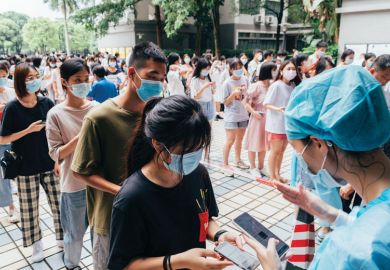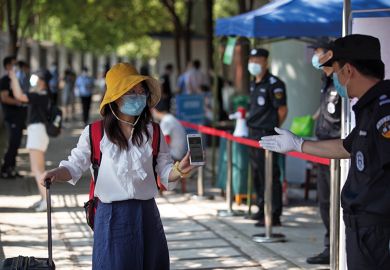Chinese universities have made compliance with coronavirus lockdowns a matter of academic discipline and put supervisors in charge of managing compliance.
Students have been punished after breaking campus lockdown rules amid sporadic Covid cases that have been reported in several provinces in China since late October. Six graduate students at Zhengzhou University were told they would lose their eligibility for an annual scholarship and other award assessments for leaving the campus without permission. Two students at Nanyang Normal University were criticised in a public notice for breaking the university lockdown rules, with their first name anonymised but student ID numbers shown. The notice did not specify what “penalty” it referred to.
These examples are just the tip of the iceberg after a year-long lockdown across Chinese campuses, where CCTV cameras and barbed-wire fences were used to make sure students obeyed lockdown rules. Last month, several hundred students were ordered to stay at or transferred to quarantine hotels from Zhuanghe University City in Dalian, amid the latest round of Covid outbreaks in this higher education hub.
In addition to the academic penalties that are linked with students’ attitude and behaviour towards Covid lockdowns, supervisors were told to be the “direct responsible person” for the students that they supervise.
It is a widely adopted procedure that students need to get a written approval from their supervisors before they apply to leave the campus for some reasons. In some cases, sick leave will only be issued after the student’s parents confirm the application. Messages behind these rules are mixed. Some universities highlight supervisors’ responsibility to “care about students, particularly those in Covid affected areas” during this difficult time, whereas some institutions used strong language in their notice, saying that preventing students from spreading the virus required a “man-to-man network”.
Henan University told supervisors that they were liable for whether their students crossed the line or not, and that this would be considered as one of the criteria of their performance review.
“Now you have got the power delegated to you, what should you do? This is how you feel about the ‘war-time style’ Covid policy,” a university teacher wrote anonymously for Guanchan: “From buses to underground, every unit of the society has been exercising their obligation to keep everyone safe…but stringent methods cannot be long-lasting.”
The author continued: “Autonomous management in university is also a type of education, which could lead to better awareness and motivation of students and should be part of the campus culture.”
Register to continue
Why register?
- Registration is free and only takes a moment
- Once registered, you can read 3 articles a month
- Sign up for our newsletter
Subscribe
Or subscribe for unlimited access to:
- Unlimited access to news, views, insights & reviews
- Digital editions
- Digital access to THE’s university and college rankings analysis
Already registered or a current subscriber?




